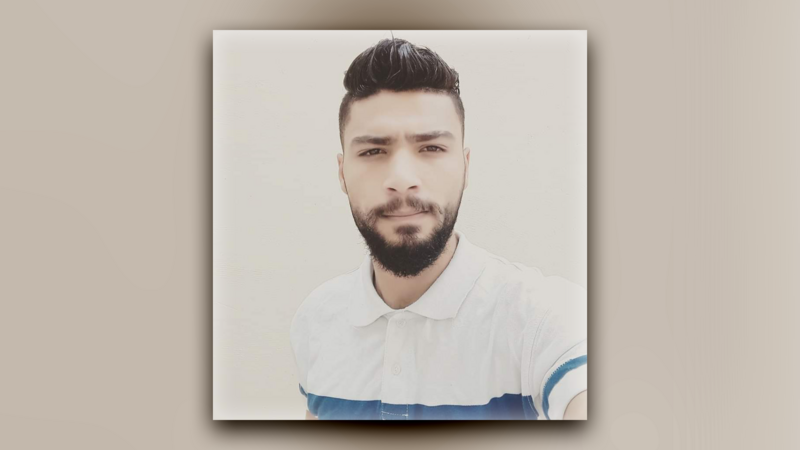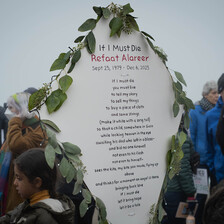The Electronic Intifada 2 May 2024

Ahmed has not been seen for almost two months. (Photo courtesy of family)
What is the first thing that I should say about my little brother Ahmed?
That he is the youngest member of the family?
That I haven’t seen him in seven years?
Or that he has been missing since 9 March?
Should I see him as a martyr whose body has not yet been found?
Has he been buried in a mass grave?
Or has he been devoured by dogs?
Is he being held in captivity by Israel?
Or has he been imprisoned and tortured to death?
Ahmed could have registered with the Egyptian authorities in an effort to leave Gaza. But he went missing before he and my father could apply for the required permit.
Both Ahmed and my dad had intended to travel after my mother and my brother Hatem.
Hatem and my mother had been placed on a list of people approved for travel to Egypt.
But my mother refused to leave Gaza unless Ahmed could accompany her. So I launched a GoFundMe campaign to raise the money needed so that Ahmed and my father could enter Egypt.
Ahmed disappeared before our family could do the paperwork for his exit journey.
My mother cries every day. She asks me to explain what has happened.
I always start crying along with her. I tell her that I don’t know what has happened but try to reassure her that Ahmed will reappear soon.
I have speculated that perhaps Ahmed got lost among the crowds in Rafah, Gaza’s southernmost city.
Ahmed lost his mobile phone at the beginning of the war so – unless someone could lend him their phone – he would not be able to call our mother.
My mom has asked why I posted Ahmed’s picture on Facebook. When she saw it, she thought that I knew something bad had happened to Ahmed but that she hadn’t been informed.
Every day, the little hope I had in my heart dies.
How can it be nearly two months since Ahmed contacted his loving mother?
A noble act
On the day before he went missing, Ahmed had helped a boy with Down syndrome from our neighborhood in Jabaliya refugee camp, northern Gaza.
The boy had been displaced to al-Zawayda in the Middle Area, where he was hit by a car.
Ahmed rushed the boy to Al-Aqsa Martyrs Hospital in the city of Deir al-Balah. Ahmed stayed with the boy until he was treated and paid more than $10 for his admission and medicine.
Then Ahmed brought the boy back to his family.
Ahmed was shocked by the reaction of the family and others, who were prejudiced against people with disabilities. They argued that he could have left the boy to die, rather than bringing him to hospital.
Ahmed believed firmly that everyone has the right to live.
My family are proud of what Ahmed did. It was noble of him to protect the boy and defend the rights of people with disabilities.
My parents would have liked to have displayed their pride by hugging Ahmed. But they never got an opportunity to do so.
Ahmed aspired to be a singer and a football player. He had been in negotiations with al-Ahly, a football club in Egypt, to join as a professional.
While those negotiations were taking place, I was studying in Malaysia. I sent him a pair of purple football boots – the type Cristiano Ronaldo would wear.
I also sent him a Real Madrid jersey.
I got Ahmed’s name printed on its back and the number seven. Ronaldo’s number.
We hoped that Ahmed would become Gaza’s Ronaldo. But when my mother found out he was negotiating to be a professional player, she objected.
She didn’t want her baby boy to be away from her. Ahmed always obeyed our mother.
Young driver
Ahmed started driving when he was incredibly young. He drove my father’s Fiat 127 in front of our home when he was just 7.
Whenever he took a taxi, he always asked to sit beside the driver. Then Ahmed would announce that he knew how to drive.
If the taxi driver agreed, Ahmed would prove so by changing the gear, while the driver held the clutch.
Ahmed became well known to Gaza’s taxi drivers.
When Ahmed turned 9, he asked our uncle Mahmoud to drive his jeep.
Mahmoud was the deputy foreign minister in the Palestinian Authority. People did not tend to approach him unless they had a connection or were introduced by a mutual friend or acquaintance.
But Ahmed was not worried about such formalities.
My uncle loved Ahmed for his courage and intelligence. Mahmoud would marvel at how Ahmed spoke as if he was a grown man.
At first, my uncle sought to refuse Ahmed’s request. But Ahmed persevered, insisting he could indeed drive.
To prove his point, Ahmed explained how to start a car.
Laughing, my uncle eventually agreed to the request. Ahmed took the keys, started the jeep and drove it a few meters in a Jabaliya parking lot.
My uncle would only receive guests who had a prior appointment. Even his own siblings had to follow that rule.
But he made an exception for Ahmed. Ahmed was welcome at Mahmoud’s villa any time.
Ahmed loved cats. My uncle gave him a beautiful Siamese cat.
As Ahmed grew up, he became a handsome young man. He hung out with people older than him and started speaking with their wisdom.
Fear
I am not writing to mourn Ahmed. I am writing to express my fear.
I fear the moment when my mother will learn the hard truth about what happened to Ahmed.
My mother seldom has a strong mobile phone signal. To get a stronger one – using an eSim card – she must visit the beach area in Deir al-Balah.
Every two or three days, my mother attempts a trip to the beach. Her health doesn’t allow her to go there more often.
She calls us from the beach. With a hesitant voice, she asks the same question: “Is there any news about Ahmed?”
The answer is always the same. And we always weep.
It has been like that for almost two months now.
To tell the story of a friend, colleague or neighbor is one thing. To speak or write about the loss of your little brother is quite another.
Perhaps we will eventually see Ahmed buried next to other bodies.
Perhaps we will see part of his body in the mouth of a hungry dog.
Or perhaps his fate will remain unknown.
Our lives in Gaza are so harsh. Israel is continuing to make my family taste various forms of torment.
May God have mercy on us.
Tamer Ajrami is a student of political science living in Belgium.





